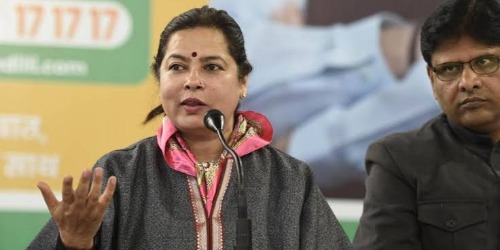"Literate Need To Be Educated": BJP Leader On Satya Nadella

A day after Microsoft Chief Executive Officer Satya Nadella voiced his opposition to the controversial Citizenship Amendment Act, BJP MP Meenakshi Lekhi today termed his statement as the "perfect example" of how even the literate need to be educated on the central government's initiatives.
"How (the) literate need to be educated! Perfect example. Precise reason for CAA is to grant opportunities to persecuted minorities from Bangladesh, Pakistan and Afghanistan," she tweeted, citing an oft-repeated explanation provided by the central government on the need for such a law.
In the same tweet, Ms Lekhi also wondered why the United States -- where Microsoft is based -- cannot grant similar opportunities to "Syrian Muslims instead of Yezidis".
The Yezidis, a monotheistic population with their roots in Iraq, Syria and Turkey, were actively targeted by ISIS earlier in the decade. Thousands from the community fell victim to a genocide orchestrated by the terror group, forcing about 15% of its population to flee to other countries.
Satya Nadella had expressed his reservations over the Citizenship Amendment Act in an interaction with BuzzFeed editor-in-chief Ben Smith at a Microsoft event on Monday. "I think it's just bad. If anything, I would love to see a Bangladeshi immigrant who comes to India and creates the next unicorn in India or becomes the CEO of Infosys, that should be the aspiration. If I had to sort of mirror what happened to me in the US, I hope that's what happens in India," he said.
A separate statement released by Microsoft India quoted the CEO of the tech giant as saying that he was shaped by a combination of his Indian heritage, the time spent growing up in a multicultural India and later by his "immigrant experience" in the United States. "My hope is for an India where an immigrant can aspire to found a prosperous start-up or lead a multinational corporation benefitting Indian society and the economy at large," he said, but added that there was some good news to be drawn from the fact that people were at least debating the law in what was a "messy democracy".
The statement was applauded by many on social media, including historian Ramachandra Guha.
Satya Nadella's comment comes amid ongoing protests against the Citizenship Amendment Act, which aims to expedite citizenship for non-Muslim migrants from three neighbouring countries. While critics claim that the law discriminates on the basis of religion, those linked to the ruling BJP maintain that those protesting it are being misled by Left parties and the Congress.
- 0
- Leave a comment
JNU Students Lathi-Charged By Cops During Protest In Delhi Over Fee Hike

Police cracked down on students of the Jawaharlal Nehru University (JNU) in New Delhi's Sarojini Nagar area on Monday, while they were marching towards Rashtrapati Bhawan to register their protest against a substantial hostel fee hike imposed by the institution's administration.
The lathi-charge was launched when agitators tried to cross the Bhikaji Cama Place Metro station, which was cordoned off by the police. Television visuals showed police pushing back students trying to jump over barricades erected there.
Students called the march from the university campus to the President's residence after after a month-long protest went in vain, with the JNU administration rejecting their demand for a complete rollback of the nearly 300 per cent hike in hostel charges. They claim that the action goes against the very character of the university, which has always kept its gates open to everybody irrespective of their economic backgrounds.
A partial rollback of the fee hike proposed by the university last month was rejected by the students, who called it a "mere eyewash".
The Jawaharlal Nehru University Students' Union had earlier emailed their demands to President Ram Nath Kovind, demanding an immediate rollback of the proposed fee hike, resignation of the Vice-Chancellor and withdrawal of all police cases against agitating students.
This morning, police had tightened security around JNU, blocking traffic on nearby roads and appealing to protesters to not resort to violence. Entry and exit points of the Udyog Bhawan, Lok Kalyan Marg and Central Secretariat Metro stations were also closed over concerns that the students may use the intra-city rail system to make their way to Rashtrapati Bhawan.
In November, JNU students had marched towards the parliament chanting anti-fee hike slogans and carrying placards and posters. Two protesters were injured in the clashes that erupted back then.
Students accuse the JNU administration of taking unilateral decisions on several issues, including the hostel fee hike, while turning a deaf ear to their suggestions. A three-member committee set up to look into ways to mediate between the agitating students and the administration has submitted its report to the Human Resources Development Ministry, but no call has been taken in this regard until now.
Kotak Mahindra, Axis Bank to hire 5,000 freshers; tech graduates top focus

Kotak Mahindra and Axis Bank, two of the largest private banks in India have said they would hire more than 2,000 fresh graduates each leading up to recruitment of around 5,000 freshers. Tech and design skills are two of the focus areas in terms of hiring.
According to a report, Kotak Mahindra said that it would hire 2,600 freshers this year. Sukhjit Singh Pasricha, Kotak Mahindra Bank's chief human resource officer told the daily that they generally hire 2,500 fresh graduates every year that account for a quarter of its total hiring. He said that around 60 per cent of fresh graduates are generally absorbed in frontline acquisition roles, while 20 per cent are hired in service roles, 15 per cent are hired in their in-house contact centre and the rest by operations and miscellaneous roles across segments.
Axis Bank said that it would hire more than 2,300 fresh graduates. Out of that, 2,000 would be for entry-level roles, around 200 from B-schools and a hundred from IITs and NITs. Rajkamal Vempati, HR head in Axis Bank said that they are focussing on hiring in risk, compliance and cybersecurity roles. IT and analytics are also two of the key areas.
There has also been an increase in the demand for highly specialised talent in multiple fields including analytics, digital banking, artificial intelligence and information security. There has also been a surge in demand for core banking roles such as acquisition, relationship and service.
Pasricha also said that while availability is not a problem, mobility of the workforce is extremely limited. He said that the millennial workforce also expects to get into a strategic role right at the beginning of their career without any exposure to the ground realities of the industry.
Govt orders IIMs, IITs to give caste-based reservation in faculty hiring

The government earlier this week instructed all central educational institutions, comprising IITs and IIMs to comply with quota rule in faculty hiring.
This directive issued by the human resource development (HRD) ministry has come days after a parliamentary panel questioned it over the poor implementation of reservation policy in faculty recruitment.
As per the constitutional provisions, all central universities in the country are mandated to implement the faculty quota- 15% reservation for Scheduled Castes (SC), 7.5% for Scheduled Tribes (ST) and 27% for Other Backward Castes (OBCs). Where all central universities do so, IITs and IIMs mostly do not provide this reservation in its entirety, as per government data, as mentioned by the Times of India.
Where the IITs enforce reservation in teacher appointment only at the entry level- assistant professors, 96% of the faculty at the IIMs are from the general category.
The HRD ministry's department of higher education in its official order issued on Wednesday said that the Central Educational Institutions (Reservation in Teachers' Cadre) Act was notified on July 9 this year to give reservation in teaching positions. Following this, the HRD ministry also issued a notification saying that any further hiring will be required to be done as per the listing prepared.
With this new order, all the institutions will now have to provide reservations in senior faculty positions (professors and associate professors) as well. The rule will be applicable to IISERs and the central government institutes in the field of research.
"Since it's an order from the government we will be implementing the policy henceforth. We are looking into the order," a senior IIM-Ahmedabad official told the news daily.
The HRD ministry had recently written to all government institutions to fully implement the Central Educational Institutions (Reservation in Teachers' Cadre) Act. The ministry had also sent a separate communication to all IIMs to ensure 'reservation of posts in direct recruitment' considering the institution as one unit- as stated in the Act that came into effect on March 7, 2019.
Children's Day: 10 ways to help your kid develop good money habits

Children's Day: 'Money doesn't grow on trees' is a saying that each one of us has heard at least once in our lives. But what if money could 'grow' and in a way that it can take care of all our needs even post-retirement?
With rising inflation, increasing lifestyle aspirations, as well as life spans, it is important to not just save money but do more with it, that is, invest it to beat inflation. Like adults, children too need to understand these concepts of personal finance management so that they are well-equipped when they have an income of their own.
But how exactly does one teach a child to do that? Children's Day is a good occasion to plan.
It's important to remember that, 'Monkey see monkey do' is the approach that children follow, so they usually pick up and replicate what they see their parents do from a very young age. Fiscal life skills is sadly not a subject taught in school, and consequently, the onus of what children learn and replicate throughout their adult lives lies squarely on the parents. Here are 10 ways for you to get started with teaching 'money skills' to your child this Children's Day:
1. Give your child a certain 'fixed' amount of pocket money every month to develop the idea of having their own money and thus, responsibility. Encourage them to not spend it all.
2. It's a good idea to give a portion of it unconditionally for them to use as per discretion. But a certain portion should be incentivised and given only based on good behaviour or on the basis of some key tasks completed.
3. Teach your children to be careful with handling money too. Money must always be accounted for. It should be counted, kept in a safe place and the child should be encouraged to put down all expenses in writing.
4. Open a bank account for the child and encourage them to deposit a certain amount regularly (ideally every month), no matter how small. Any bonus amounts such as what they get from relatives or get from parents on special occasions should be put in that account.
5. Encourage them to take up small jobs in their holidays which they can be paid for. This will help them learn how to make money in their spare time.
6. As a weekend activity, share newspaper articles from magazines or the internet about savings and investments and have discussions around it. Discuss investment instruments such as mutual funds and the importance of having health insurance. Explain it in simple terms with examples and help them feel comfortable about these terms. This will make them understand the fundamentals of having good financial health.
7. As children get older (12+), ask for their suggestions or feedback about some important family decisions such as buying a new home or a new car, or a big holiday plan. Discuss it in terms of its fiscal fundamentals and how that works - in terms of down payments, EMIs etc. Get them to see its different elements and how you make each rupee go that extra mile. Give them an opportunity to come up with solutions as well. They may come up with interesting observations that will surprise you.
8. Encourage children to start a SIP from their own bank account which you would have to manage as the guardian. This is the time to give them investment targets and interest-based goals.
9. When children are 15 or 16 years old, they could be allowed to use their debit cards under adult supervision. This will give them the freedom of using their own money for their 'wants.' If by now, they've been managing their money for a few years, you should hopefully already see some element of fiscal prudence.
10. It's a good idea to set goals with children from an early age. They should learn the power of having fixed financial goals and saving up for them incrementally. Encourage them to develop small goals for themselves, like saving up to buy that X-box or a holiday with friends.
Finally, it's important to remember to take out time along with your spouse to have conversations about productive ways of making money and growing the corpus, as opposed to conversations about the lack of it and worries around it. Children absorb subliminal messages and are more likely to follow what you do than what you say. Finally, empower your child with the right values, both about life and money.


